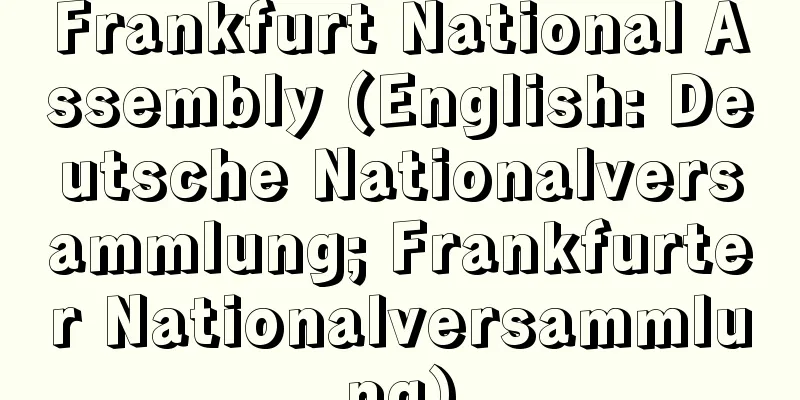Frankfurt National Assembly (English: Deutsche Nationalversammlung; Frankfurter Nationalversammlung)

|
The first national parliament in Germany was held in Frankfurt am Main in 1848. Prior to the March Revolution in Vienna and Berlin, 51 liberals from South Germany gathered in Heidelberg on March 5, and then representatives of prominent liberals and major organizations from all over Germany gathered in Frankfurt am Main from March 30 to April 3 to hold a preliminary meeting, where they decided to elect representatives by universal suffrage from each state. Based on this, the German National Assembly was held in the Paul's Church in Frankfurt am Main on May 18. The assembly had a fixed number of 831 members, but only 330 attended the opening ceremony, and afterwards an average of 400 to 500 people attended. In December 1848, the "Fundamental Rights of the German Nation" was published, and the German National Constitution based on this was promulgated in March of the following year. This constitution adopted a constitutional monarchy and stipulated that the imperial crown of the German emperor be bestowed on the Prussian King Frederick William IV, but the king rejected this. The German parliament was led by the German senator, who was the head of the German parliament, and the German senator, who was the head of the German parliament. Source: Encyclopaedia Britannica Concise Encyclopedia About Encyclopaedia Britannica Concise Encyclopedia Information |
|
1848年フランクフルトアムマインで開かれたドイツ最初の全国的議会。ウィーン,ベルリンの三月革命に先立ち,3月5日南ドイツの自由主義者 51名がまずハイデルベルクに,次いで3月 30日から4月3日にかけて全ドイツの著名な自由主義者および主要団体の代表者がフランクフルトアムマインに参集して予備会議を開き,各邦から普通選挙によって議員を選出することを決定。これに基づいて5月 18日,同地のパウロ教会でドイツ国民議会が開催された。議員定数は 831名であったが,開会式列席者は 330名,その後は平均 400~500人が出席した。 48年 12月には「ドイツ国民の基本権」を公表し,これに基づくドイツ国民憲法を翌年3月公布。この憲法は立憲君主制を採用し,ドイツ皇帝の帝冠をプロシア王フリードリヒ・ウィルヘルム4世に捧げることを定めたが,王はこれを拒絶した。このため南西ドイツ一帯に憲法擁護のための反乱が起ったが,プロシア軍により鎮圧され,一方プロシア政府は自国の議員を召喚し,他国もこれにならい,穏健派はフランクフルトアムマインを去ったので,議会には結局左派のみが残存した。これら左派は,49年5月シュツットガルトで会合を重ねたが,ウュルテンベルク政府の武力弾圧によって解散させられた。
出典 ブリタニカ国際大百科事典 小項目事典ブリタニカ国際大百科事典 小項目事典について 情報 |
>>: Frankfurt School (English: Frankfurterschule) German
Recommend
Taimin Tachibana - Taimin Tachibana
A small tree of the Ardisiaceae family found in mo...
Lyallpur
...Population: 1.88 million (1995). Formerly know...
School of learning
[1] 〘noun〙① A room for studying. A study. A writin...
Lantern - Toro
A type of lighting fixture. Also written as '...
Black rat
It is a member of the rodent family of the mammal...
Regular payment after listing - Ichirankoteikibarai
A method of determining the due date for a bill of...
Temporary Shrine Transfer - Karido no Sengu
〘 noun 〙 When remodeling or repairing a shrine, th...
Imperial Rule Assistance Association
An official national integration organization dur...
Tracer bullets
A bullet that glows as it flies, allowing the bul...
Carex cyperoides (English spelling)
…[Tetsuo Koyama]. … *Some of the terminology that...
Railroad tracks
〘noun〙① A line that goes straight in a certain dir...
Commentary on the Sutra of the Emperor
A collection of classics from the Qing Dynasty in ...
Cargo Cult
A millennialist religious movement that occurred m...
Ritsurin Garden
This prefectural park is located in Ritsurin-cho,...
Eutectic mixture
A solid mixture is obtained when two components, ...









